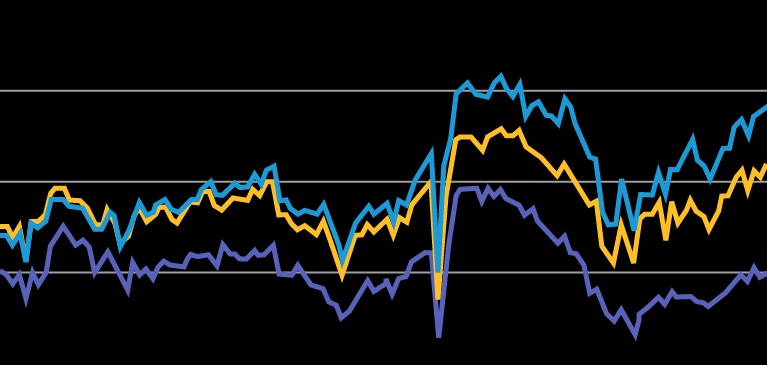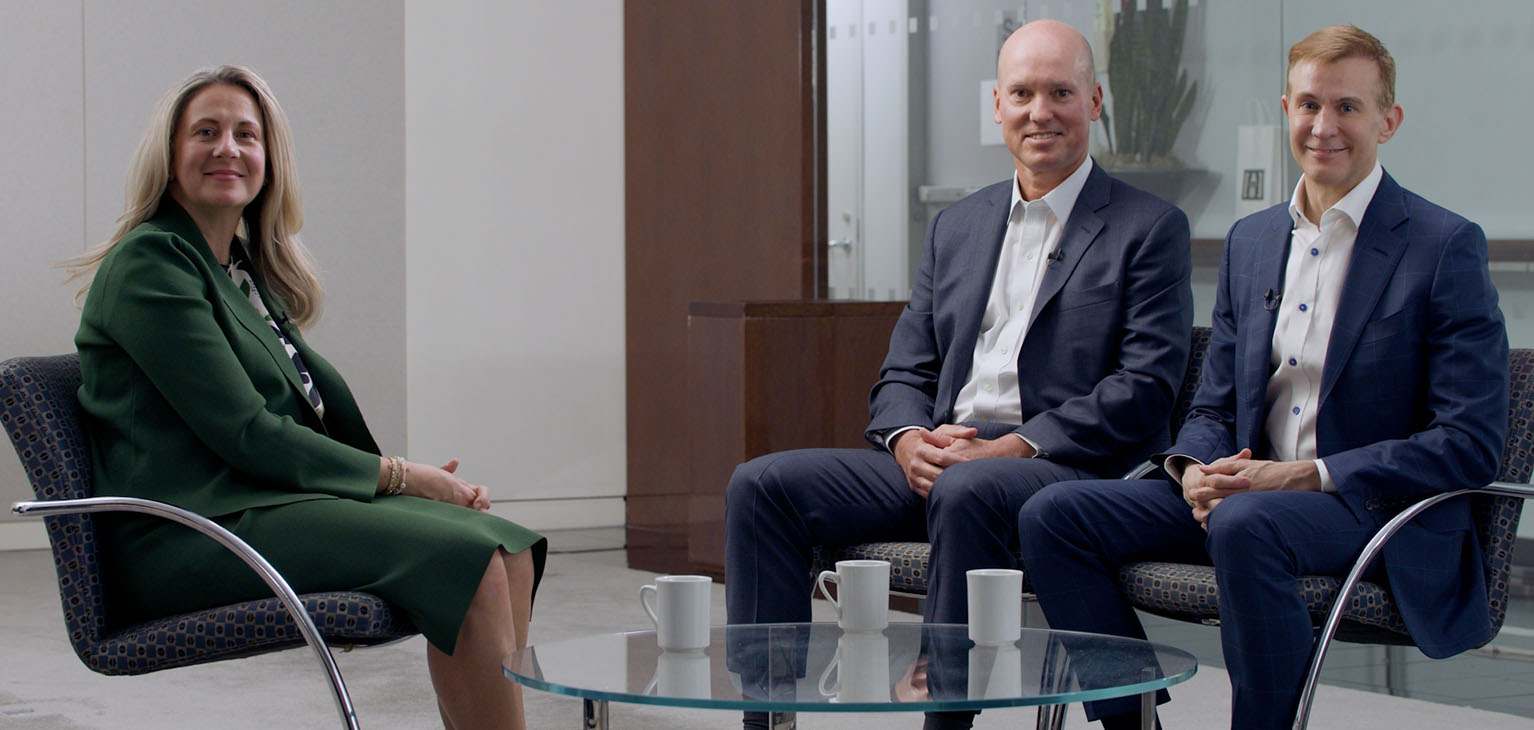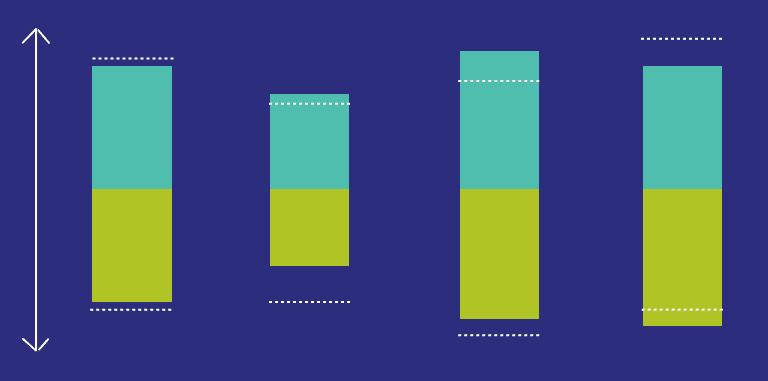
Kent Hargis, PhD
22 Years at AB|30 Years of Experience
Kent Hargis is the Chief Investment Officer of Strategic Core Equities. He created the Strategic Core platform and has been managing the Global, International and US Strategic Core portfolios since their inception in 2011. Hargis has also been Portfolio Manager for the Global Low Carbon Strategy Portfolio since 2022. Previously, he managed the Emerging Portfolio from 2015 through 2023. Hargis was global head of quantitative research for Equities from 2009 through 2014, with responsibility for directing research and the application of risk and return models across the firm’s equity portfolios. He joined AB in 2003 as a senior quantitative strategist. Prior to that, Hargis was chief portfolio strategist for global emerging markets at Goldman Sachs. From 1995 through 1998, he was assistant professor of international finance in the graduate program at the University of South Carolina, where he published extensively on various international investment topics. Hargis holds a PhD in economics from the University of Illinois, where his research focused on international finance, econometrics and emerging financial markets. Location: New York
Published Work

Following a defensive equity playbook can help investors prepare for market volatility in a year of heightened uncertainty.
Kent Hargis | 03 February 2025
If climate portfolios are positioned in the same giant US stocks held in broad equity allocations, investors may unwittingly double down on risk.
Kent Hargis, Teresa Keane, Brian Holland | 31 October 2024
The case for renewables transcends politics.
Xiaoyu Gu, Kent Hargis, Kathleen Dumes | 13 September 2024
Recent market volatility has reinforced the importance of casting a wider net to find attractively valued companies for equity portfolios.
Kent Hargis, Brian Holland | 28 August 2024
Technological disruption creates opportunity—and volatility. But there are ways to capture AI innovation while managing risk.
Kent Hargis, James Russo | 20 May 2024
Building a low-carbon equity strategy requires a wide view of the forces shaping businesses and returns, including climate change.
Inigo Fraser-Jenkins, Kent Hargis, Sara Rosner | 29 February 2024
Active management is key to investing in climate-focused equity portfolios. Here’s why.
Erin Bigley, Kent Hargis, David Wheeler | 13 February 2024
Defensive equity strategies that limit downside losses but lag too much in up-markets may be missing the mark. Is there another way to reduce volatility?
Kent Hargis, Brian Holland, Ian McNaugher | 23 January 2024
Powerful forces are creating attractive opportunities in climate-focused companies for equity investors.
Erin Bigley, David Wheeler, Kent Hargis | 11 January 2024
Human behavior can lead to irrational investment decisions, but a well-planned low-volatility strategy may be the antidote.
Kent Hargis, David Wong, Teresa Keane | 23 October 2023
New public policies reflect growing urgency to address climate risk, which equity investors should emphasize, too.
Kent Hargis, Ian McNaugher, Jayme Lisiewski | 31 July 2023
When markets are rising, investors don't always prepare for turbulence. Yet we think the best time to build a defensive plan for an equity allocation is before volatility strikes.
Kent Hargis | 25 July 2023
Climate investing takes a holistic approach to address today’s risks and pursue future growth potential among quality companies.
Kent Hargis, Teresa Keane, David Wheeler | 11 May 2023
Technology and healthcare are good examples of sectors that can play different equity-allocation roles than you might expect.
Kent Hargis, Vinay Thapar | 21 March 2023
As corporate earnings continue to adjust to a new regime, markets are likely to be volatile in 2023. What can equity investors do to reduce risk?
Kent Hargis, Sammy Suzuki | 17 January 2023
Investors may be surprised to discover how a strategy targeting stocks that lose less in a downturn can beat the market over time.
Kent Hargis, Sammy Suzuki | 12 September 2022
These guidelines can help investors frame a defensive strategy for volatile times and bolster confidence to stay in equities through an uncertain period ahead.
Kent Hargis, Sammy Suzuki | 13 July 2022
As a storm of volatility continues to rage in equity markets, here are some strategies that can help investors reduce risk and stay invested through the turbulence.
Kent Hargis, Sammy Suzuki | 16 May 2022
For investors seeking more stable equity allocations, stocks with high-quality features and reasonable valuations can help portfolios cope with volatility.
Kent Hargis, Sammy Suzuki | 09 February 2022
Equity investors focused on a low-carbon strategy needn't compromise on company fundamentals. When quality and compelling valuations are equally considered, joining the global fight against climate change and generating strong return potential can work hand in glove.
Roy Maslen, Kent Hargis, Sammy Suzuki | 22 November 2021
Steady earnings combined with resilient business models and innovation should compel investor interest, but it hasn’t. Is the time right for a reversal?
Kent Hargis, Ian McNaugher, Sammy Suzuki | 31 August 2021
Across the industrial sector, low-carbon investing naturally leans toward renewable energy opportunities, like wind and solar power. But it can go beyond just renewables, and more industrial companies are taking the extra step to lower emissions with efficient energy technologies and by more accurately measuring their carbon footprint.
Roy Maslen, Kent Hargis, Sammy Suzuki | 24 March 2021
The exit from the pandemic will be bumpy. Defensive stocks with attractive valuations can help provide balance through an uncertain recovery.
Kent Hargis, Sammy Suzuki, Chris Marx | 01 March 2021
Global stocks rebounded sharply from the coronavirus market crash in 2020, but the ride was rocky. With so many risks clouding the outlook, we believe that investors should focus on generating a smoother pattern of returns through the recovery from COVID-19.
Kent Hargis, Sammy Suzuki, Chris Marx | 19 January 2021
Defensive equities are usually found in sectors that have withstood market shocks, such as utilities and real estate. But as COVID-19 shakes up investment conventions, companies with intangible assets are being more appreciated for their volatility cushion.
Kent Hargis, Sammy Suzuki, Chris Marx | 04 November 2020
Several equity factors diverged significantly from their typical performance patterns during the COVID-19 crisis. By understanding how factor returns behaved in this market correction relative to their historic norms, investors can not only prepare for future volatility but also take advantage of short-term market dislocations.
Kent Hargis, Sammy Suzuki, Jillian Geliebter | 31 July 2020
Following these guidelines can help equity investors navigate the uncertainty created by the COVID-19 pandemic when selecting stocks and positioning portfolios.
Kent Hargis, Sammy Suzuki, Chris Marx | 30 March 2020
Even as global stocks climbed in 2019, market volatility persisted. By some measures, lower-volatility stocks now look quite expensive. But in fact, high-quality stocks that can help protect portfolios can be found at reasonable prices, if you know where to look.
Kent Hargis, Sammy Suzuki, Chris Marx | 17 January 2020
Rejoice—people around the world are living longer! But pause the festivities—that means they need more retirement money. To ensure they don’t run out of cash, savers need to adjust their investment strategies as their needs change, both before and after retiring.
Sammy Suzuki, Aditya Monappa, Kent Hargis | 22 August 2019
Global stocks rebounded in the first quarter, but the ride was rocky. Even in a rising market, volatility is a clear and present danger. With so many risks clouding the outlook, we believe that investors should focus on generating a smoother pattern of returns.
Kent Hargis, Sammy Suzuki, Chris Marx | 30 April 2019
After a volatile year in global markets, equity investors are on high alert. With so much uncertainty about the macroeconomic growth outlook, we think it's important to make sure that an equity allocation is positioned to do well no matter what happens to the economy.
Chris Marx, Kent Hargis, Sammy Suzuki | 30 January 2019
Recent volatility reminds us that new risks are testing standard defensive equity strategies. Portfolios that offer downside protection need to go beyond standard risk models and position themselves for changing challenges ranging from trade wars to European political instability.
Kent Hargis, Sammy Suzuki, Chris Marx | 13 November 2018
Changing market conditions over the last five years have taught us a few things about managing risk. The most important lesson? Delivering downside protection constantly requires refining and adjustment.
Kent Hargis, Chris Marx, Sammy Suzuki | 16 January 2018
Soaring stock prices thrill investors, but it's the disciplined, less glamorous efforts to not lose money that build lasting wealth. It's possible to get downside protection and still beat the market over time. Here's how.
Kent Hargis, Sammy Suzuki, Chris Marx | 04 October 2016This information is for exclusive use of the wholesale person to whom it is provided and is not to be relied upon by any other person. It is not intended for retail or public use and may not be further distributed without prior written consent of ABAL.
This webpage has been prepared by AllianceBernstein Australia Limited (“ABAL”)—ABN 53 095 022 718, AFSL 230 698. Information in this webpage is only intended for persons that qualify as “wholesale clients,” as defined by the Financial Markets Conduct Act 2013’, and is not to be construed as advice. This webpage is provided solely for informational purposes and is not an offer to buy or sell securities. The information, forecasts and opinions set forth in this webpage have not been prepared for any recipient’s specific investment objectives, financial situation or particular needs. Neither this webpage nor the information contained in it are intended to take the place of professional advice.
You should not take action on specific issues based on the information contained in this webpage without first obtaining professional advice. Past performance does not guarantee future results. Projections, although based on current information, may not be realized. Information, forecasts and opinions can change without notice and ABAL does not guarantee the accuracy of the information at any particular time. Although care has been exercised in compiling the information contained in this webpage, ABAL does not warrant that this webpage is free from errors, inaccuracies or omissions. ABAL disclaims any liability for damage or loss arising from reliance upon any matter contained in this webpage except for statutory liability which cannot be excluded.
No reproduction of the materials on this webpage may be made without the express written permission of ABAL. This information is provided for persons in Australia only and is not being provided for the use of any person who is in any other country.
